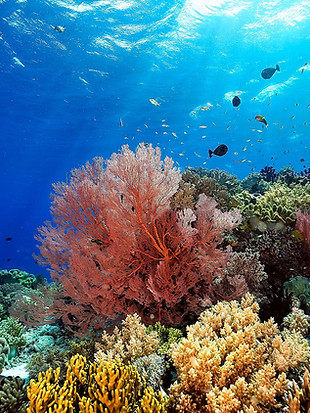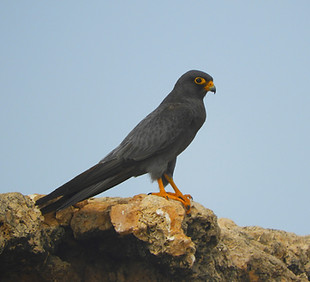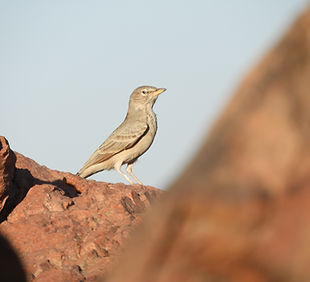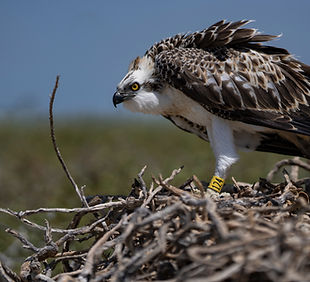
OUR PROJECTS
At Island Biological Consultants, our commitment to help preserve ecosystems and habitats and this is reflected in our extensive conservation projects.
We are proud to share several case studies of the important work we do.
Below, you can explore our efforts to protect and restore biodiversity, from seabird censuses to invasive species management.

2025

2025
Coral Regeneration Project:
Red Sea Global
Island Biological Consultants is proud to be partnering with a Saudi Arabian Giga Project on their ambitious Coral Regeneration Project. Our dedicated aquarist plays a crucial role in supporting the Coral Regeneration Lab, ensuring the maintenance and health of coral species vital to the ecosystem. This project involves managing eight semi-closed aquarium systems, including four ex situ spawning systems, and assisting with coral propagation and restoration activities. By working closely with the team, our aquarist contributes to advancing coral restoration efforts in the region while providing valuable knowledge transfer to local teams. With an emphasis on marine conservation, this project represents a key step toward sustainable ecosystem management.

2025
Installation of Live Osprey Nest Box camera
In 2025, we installed a live camera on a Osprey nest in the Al Wajh Lagoon to provide real-time monitoring of breeding behaviour and chick development. This initiative offers an unprecedented view into the lives of these remarkable birds in the Red Sea while supporting ongoing conservation efforts. The monitoring of this pair also keeps an eye on a satellite tagged parent.
2024

2024
Installation of Nest Boxes for Sooty Falcons across the Al Wajh lagoon
In 2024, our team and our client undertook the installation of specialised nest boxes for Sooty falcons across the Al Wajh Lagoon. This initiative increased nesting areas and provided secure and suitable breeding locations, helping to mitigate the challenges these falcons face due to habitat loss. The project is a vital component of our broader efforts to support the breeding success and long-term conservation of Sooty falcons in the region.

2024
Installation of Live Sooty Falcon Nest Box camera
In 2024, we installed a live camera within a Sooty Falcon nest box in the Al Wajh Lagoon to provide real-time monitoring of breeding behaviour and chick development. This initiative offers an unprecedented view into the lives of these remarkable birds while supporting ongoing conservation efforts.

Summer 2024
Census and Breeding Success of Seabirds and Sooty Falcons in Al Wajh Lagoon
The summer of 2024 saw another detailed census and breeding success evaluation of seabirds and sooty falcons in the Al Wajh Lagoon. As the client has done the census in 2021, we now have trend data for the birds across the lagoon for several years. This time, the study also included GPS tagging of Lesser-crested Terns, further expanding our understanding of the region's avian species.

Spring 2024
Extensive Land Bird Survey in the Red Sea Zone
In spring 2024, we conducted an extensive survey of terrestrial birds throughout the Red Sea Zone, including night surveys to detect nightjars and owls. This comprehensive study expanded our knowledge of avian biodiversity in the region and supported conservation efforts.
2023

Throughout 2023
Land Bird Survey within the Red Sea Zone
Throughout 2023, we conducted a year-long survey of terrestrial birds within the Red Sea Zone. This comprehensive study monitored species detectability, habitat use, and species diversity, contributing valuable data.

2023-24
Complete Survey of Al Wajh Lagoon to Detect Invasive Rodents and Cats
From 2023 to 2024, we undertook a full-scale survey of the Al Wajh Lagoon to detect the presence of invasive rodents and cats. This survey was essential in identifying hotspots of invasion and informing targeted control measures to protect the lagoon's biodiversity.

2023-24
Feasibility Study for the Removal of Invasive Species from Al Wajh Lagoon Islands
During 2023-24, we completed a feasibility study to assess the potential for removing invasive species from islands within the Al Wajh Lagoon. This study provided a strategic plan for eradicating these species to restore and preserve native ecosystems.

Winter 2023
Census and Breeding Success of Ospreys across Al Wajh Lagoon and AMAALA Islands
In winter 2023, our team extended its efforts to include ospreys, conducting a comprehensive census and evaluating their breeding success across the Al Wajh Lagoon and AMAALA Islands. Satellite tagging was utilized to monitor osprey movements, providing vital insights for conservation planning.
2022-23

Summer 2023
Census and Breeding Success of Seabirds and Sooty Falcons in Al Wajh Lagoon and AMAALA Islands
Building on previous work, the summer of 2023 involved another round of censuses and breeding success assessments of seabirds and sooty falcons in the Al Wajh Lagoon and AMAALA Islands. GPS and satellite tagging efforts were continued to deepen our understanding of these species' ecological needs.

Spring 2023
Desktop Study for Control of Rodents across Al Wajh Lagoon
In spring 2023, we completed a desktop study focused on developing strategies for controlling rodent and cat populations across the Al Wajh Lagoon. This study combined existing research and expert insights to inform future interventions aimed at protecting the native ecosystem.

Winter 2022-23
Trial Survey of Invasive Rodents and Cats on Islands in Al Wajh Lagoon
During the winter of 2022-23, we carried out a trial survey targeting invasive rodents and cats on selected islands within the Al Wajh Lagoon. This initial study aimed to assess best practice of survey on the lagoon and assess the impact of these invasive species, laying the groundwork for future eradication and control strategies.

Summer 2022
Census and Breeding Success of Seabirds and Sooty Falcons in Al Wajh Lagoon and AMAALA Islands
In the summer of 2022, our team conducted a thorough census and assessment of seabirds and sooty falcons across the Al Wajh Lagoon and AMAALA Islands. We deployed GPS and satellite tagging to track sooty falcons, providing critical data on their breeding success and movement patterns, which are essential for ongoing conservation efforts.
